Men They Couldn't Hang - Interview
by John Clarkson
published: 12 / 4 / 2015
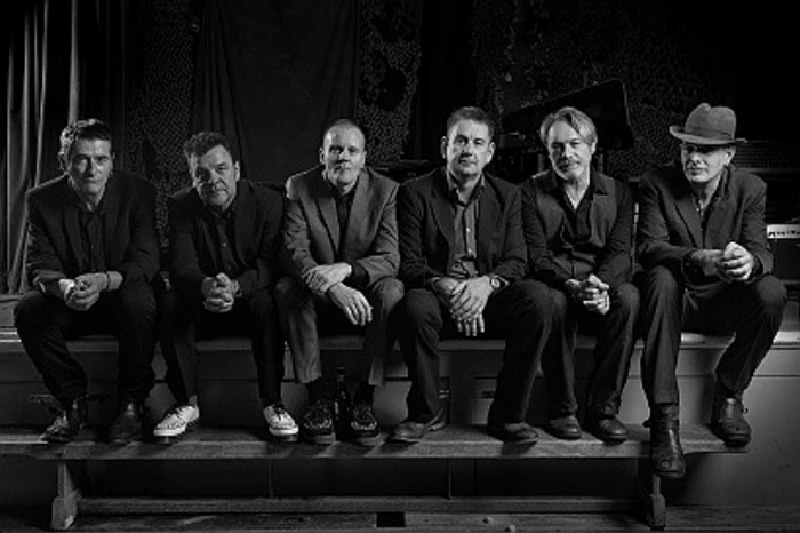
intro
John Clarkson speaks to Paul Simmonds, the main songwriter with cult folk/punk group the Men They Couldn’t Hang about his band's first album in five years, 'The Defiant', and their thirtieth anniversary
The Men They Couldn’t Hang are concluding their thirtieth anniversary year by playing a gig at the Shepherd’s Bush Empire in London on Saturday April 4th. The London/Southampton cult folk/punk group the Men They Couldn’t Hang, which still consists of original members Phil “Swill” Odgers (vocals, acoustic guitar, melodica), Stefan Cush (vocals, electric guitar) and Paul Simmonds (mandolin, bazouki) and also Ricky McGuire (bass guitar), Tom Spencer (electric guitar, acoustic guitar, banjo) and Sputnik Weazel (drums, percussion, piano, keyboards), have had a fantastic year. They have played gigs from London to Lerwick, and also released in October their eleventh album and first in five years, the PledgeMusic-sponsored ‘The Defiant’, which as always with the Men They Couldn’t Hang combines historical reference and left–wing politics. Pennyblackmusic spoke to main songwriter Paul Simmonds about ‘The Defiant’ and the thirtieth anniversary. PB: The main lesson of ‘The Defiant’ seems to be that we should start paying closer attention to history if we want to avoid making the same mistakes of the past. Would you agree with that? PW: Yes, I think that has been a common theme of the Men They Couldn’t Hang and certainly my song writing from way back in 1985 when I wrote ‘Iron Masters’ and ‘Shirt of Blue’. Those songs were written about the Miners’ Strike that was happening at that time, but used historical themes to illustrate that. It is a regular theme for us which we reiterate regularly. PB: It features a fifteenth century sailing ship on its cover, and many of the songs that appear on the album –‘Raising ell’, ‘Bonfires’, ‘Scavengers’, ‘Night Ferry’, ‘Tavarado’ – all have a nautical theme. Did you write the album around this theme or did you have a lot of songs to choose from already? PS: I live in Southampton and grew up here. About two years ago I started writing a suite of songs all based around this area, and a lot of these songs have found their way on to the album. There is a small village called Burlesdon just north of Southampton. I did a lot of digging on this, and the original boatyard in which Henry V built his initial great warships was there. The wood for it came from the New Forest, and was transported for it through the South Coast to Burlesdon. There he built his first great warship called Grace Dieu, ‘the Grace of God’, and that was the beginning of the Royal Navy. The beginning of the Royal Navy was the beginning of British power. So, in my own mind I started to construct this tale about the birth of the British Empire. And from that point on - once I had that – I continued to do some more digging, and that led me on to write ‘Bonfires’ which is about Henry V’s army gathering to cross the Channel to the Battle of Agincourt. They crossed the Channel again just down the road from Southampton. ‘Tavarado’ was about how the Empire was born in crime. The privateers were basically given a licence to be pirates. They went to the monarch and Queen Elizabeth I for permission, and helped to establish our place in the world through terrorism. ‘Tavarado‘ tells of how these ships were crewed by people who had worked the fields and been peasants, and when they went out to sea they got a share of the booty. Then they came back here, and they went down the South Coast to Suffolk and Hampshire. They were rolling in money, and what they did with the money was buy the land around the area, and then they went from being humble men to finding these great family dynasties. They became the new aristocracy, but it was all founded on crime and bloodshed. The point that I am trying to make is that the descendants of the ruling class were all criminals (Laughs), and that our capitalism and empire was founded in crime. It is another of the underlying themes of the band. PB: Obviously you could make the connotation from that that the fundamentals of society are still founded on crime. PS: I believe so. For me the great crimes that are committed in our current society now are all legal crimes committed by the establishment on the people. I don’t make any apology for that point of view at all. PB: To take that point further, ‘Scavengers’ is about the haves and have nots. It is clearly set in the past, but it could be as much about now and this government’s reaction to the working class. PS: I thought about setting it in the present actually. The inspiration for ‘Scavengers’, however, comes from the 1714 Riot Act. You know how people say the reading of the Riot Act. I actually went and found the Riot Act online. There is a document called the Riot Act. I read it and parts of it were definitely dull, but there was enough interesting material in there to give me a first verse. The basic premise of the Riot Act was that Parliament gave local governments the authority to break up any groups of twelve or more by force and violence if necessary, and I certainly intended it to be a conversation between the haves and have nots . It is written from the point of view of the government, and the first part of it is saying to the working classes that you have come much further than we ever intended to allow you. You have got houses. You have got toilets, and you have got an education. You have gone to university. What more do you want? It is kind of like saying, “Well, you have gone far enough now. It is time you went back a few steps really.”And that is what I see is going on in our nation now. PB: ‘Silver Chains’ takes the stance that being rich has its own kind of imprisonment. PS: It is my favourite song on the album. It is about the silver chain, the golden reins, the manacles of wealth and their impact on the manacles of poverty. I was vaguely aware of the Wordsworth poem ‘London Bridge’, which deals with the same theme, and it was a starting point and an inspiration if you like. I wanted to write a little hymn and that is what it turned into, a kind of hymn, a four verse hymn with a simple but timeless message which has been made many times before, and that was to say that the acquisition of goods and the wealth that you carry around with you is a manacle. It is carrying you down. I am very proud of ‘Silver Chains’. It has got very little comment in the general reaction to this album. It seems to have been hidden away a bit, but that is okay because these things get discovered as time goes by. PB: Fans and critics seem to have picked up on ‘Bonfires’ in particular because of its connotations with the First World War and its recent centenary. PS: And that is fair enough. When you are chucking out your first record in five years as we were with ‘The Defiant’, you are aware that you are going to need a couple of ear-catching, straightway tracks. ‘Bonfires’ really fits that bill. It is a traditional Men They Couldn’t Hang audience-pleasing song, and we needed that. We needed stuff that was going to reassure people that we were still the same. PB: The last track ‘Twilight Road’ is set in current times, and tells of being stuck in traffic while on a long journey. What was the inspiration behind that song? PS: It really is about a fear of aging, the feeling that you still have so much to do and –as I am now in my 50s- yet being aware that the end of the road is closer than the beginning. In this case I am stuck in a traffic jam, but that is a symbol for time running out in general and feeling have I said enough, have I done enough, have I wasted my time? PB: At the time you were working on ‘The Defiant’ you were also working and helping to write ‘A History of Insolence’, which is your partner Naomi Bedford’s album. They ended up coming out within two weeks of each other. PS: I had to split myself into two to get those records done. It was the hardest thing that I have ever done. I just had to do the best that I could do. I, however, also felt that it was my time and that I could do it. I felt strong. I had loads and loads of good songs, and wanted to show both sides to my song writing here. I do look upon the two albums as part of the same piece and very much in unison with each other. I doubt that a lot of other people would agree with me and that is just from my perspective. Musically and stylistically they are different. Naomi is much more of an Americana act, but they have the same themes that I have and are tempered with a bit more melancholy and an awareness of aging. I am very proud of both those records. It was extremely tough physically and I came quite close to just running away from everything. There were times when I thought, “I just can’t take anymore,” but I am glad now that I managed to hold on and do the two of them (Laughs). PB: On top of that you have been balancing a solo career for much of the time that you have been in the Men They Couldn’t Hang. Do you write specifically for both the Men They Couldn’t Hang and your solo career? PS: I sometimes write specifically for the Men They Couldn’t Hang, sometimes I write for Naomi and sometimes I write specifically for myself. I have all these different hats that I put on. I will try to go, “Today this will be a track for the Men or this is going to be ...” But it doesn’t always work out that way. Nobody is that in control. Not even Bob Dylan. Sometimes a song takes on a life of its own and a song that you thought would be someone else’s thing you might think, “Well, I did a pretty fair job of that. I will keep that for myself.” Or maybe it will be vice versa. I enjoy being two or three different people really. PB: You ran a very successful Pledgemusic campaign with ‘The Defiant’. Were you surprised at how quickly you both reached and went beyond your target? PS: We have got a really enthusiastic fan base, but I was still surprised. I thought that we would do it, but I had no concept that we would double it and smash it within a week. I really didn’t think that would happen. I thought, “Oh my God! Why did we ever sign a bloody record deal?” It was ridiculous really. The thing about running a PledgeMusic campaign is that it is all down to you. We had over 1,500 pledges to fulfil. You have to fulfil every single one of them before you can access the files to record your record, and some of the Pledges were really difficult. While some of them were fairly straightforward like written lyrics or an album poster, others were much more creative based. They all set different challenges. PB: For one Pledge you offered your guitar which you had had since 1990. Did you end up parting with it? PS: I did. That was fine though. I was ready to let it go. I am the kind of guy who if the moment is there I will go with it. I was ready to let that guitar go. I wanted to move back to mandolin and bouzouki as my main instruments. I had held the floor on guitar for a long time, without ever feeling that it was my forte to be honest with you. We got Tom to take over the guitar and I moved back to mandolin and bouzouki. I still play guitar with Naomi and for my solo caeer, but in the context of the band I am back on mandolin where I am much happier. It was a symbolic thing giving the guitar up. PB: What have been the main highlights of the 30th anniversary year? PS: Playing the Shetlands was quite amazing. I love the Shetlands. It was a terrific show and a terrific highlight. Our first show at the Shepherd’s Bush Empire right at the start of the year was great as well, but just really the reaction from the fans and the music world in general has been really gratifying. It feels nice to be relevant. It feels nice to have survived this long. When we started our band, our contemporaries were bands like the Mighty Lemon Drops. We have seen through so many movements and acts in British music scene since then. We recorded in the same studio as the Stone Roses when they made ‘Fool’s Gold’. We were in the studio next door. There are a lot of other stories similar to that we also have. I am very proud that we are still intact and strong. PB: Why do you feel that you have achieved such longevity? That must be a question that you get asked a lot. PS: We still like each other. That is an important fact. The people in the band get on. Forming the band was an extension of our friendship really, and it was an opportunity for us to hang out with each other. The fans have been a huge factor as well. Their enthusiasm enthuses us, and thirdly and just as importantly is the feeling that we have never been appreciated to the level that we deserve. We still feel that we have something to prove. PB: You have done pretty well but do you think that if you had been more famous that it might, as it has become for many bands, horribly destructive? PS: That is true, and “Swill” often makes the point that if we had had a massive hit single early on in our career that there is no way that we would be here now. Cush often says that if we had had one or two hit records we would be dead (Laughs). From my point of view, I have always felt that the Men They Couldn’t Hang have been underestimated and underrated, and that has really made me want to keep going. It is a double-edged sword though. PB: You started the anniversary year at Shepherd’s Bush Empire, and you’re finishing it at Shepherd’s Bush. Why did you decide to begin and end there? PS: We began there. We began in Shepherd’s Bush. That was our home. That was where we used to hang out. We have always felt that Shepherd’s Bush is our spiritual home. PB: And can you say what fans might expect at the gig on April 4th? PS: Well, just a rip-roaring Men They Couldn’t Hang gig, a selection of tracks from across our back catalogue and also some new stuff, and Cush will probably get his top off and leap into the crowd. There will be a couple of surprise guests. We won’t say anything before the night. I suspect that we will all end up jumping around even though we are far too old to (Laughs). PB: And finally what do plan to do next once the Shepherd’s Bush gig is over? PS: We will be doing a couple of festivals. Otherwise the Men They Couldn’t Hang will have a slow summer. After a heck of a year, we are probably due some time off (Laughs). I have got a lot on with Naomi. We have just been nominated for a Radio 2 Folk Award, so we are going to be playing a fair bit during the spring and summer. We have got a little combo that we are going to take out for a few festivals, and then with the Men They Couldn’t Hang it is just like the ocean. The tide will be back after a little regress, and there will be something else on the horizon. PB: Thank you.
Picture Gallery:-
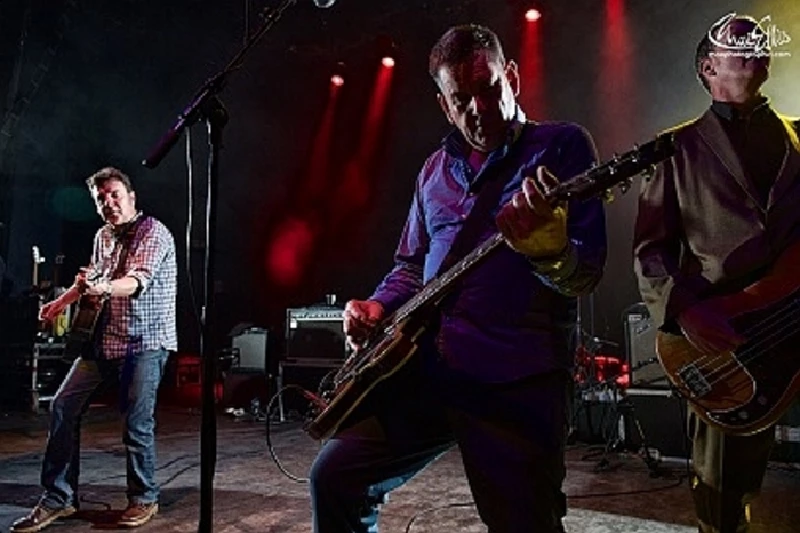
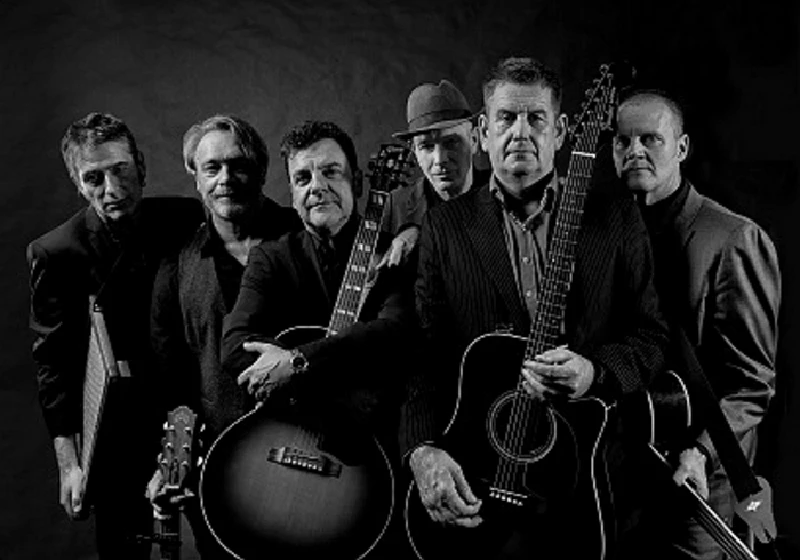
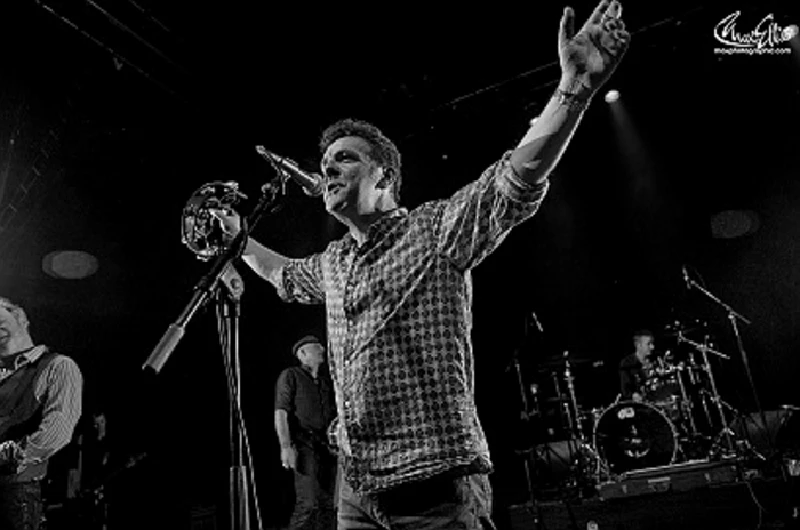
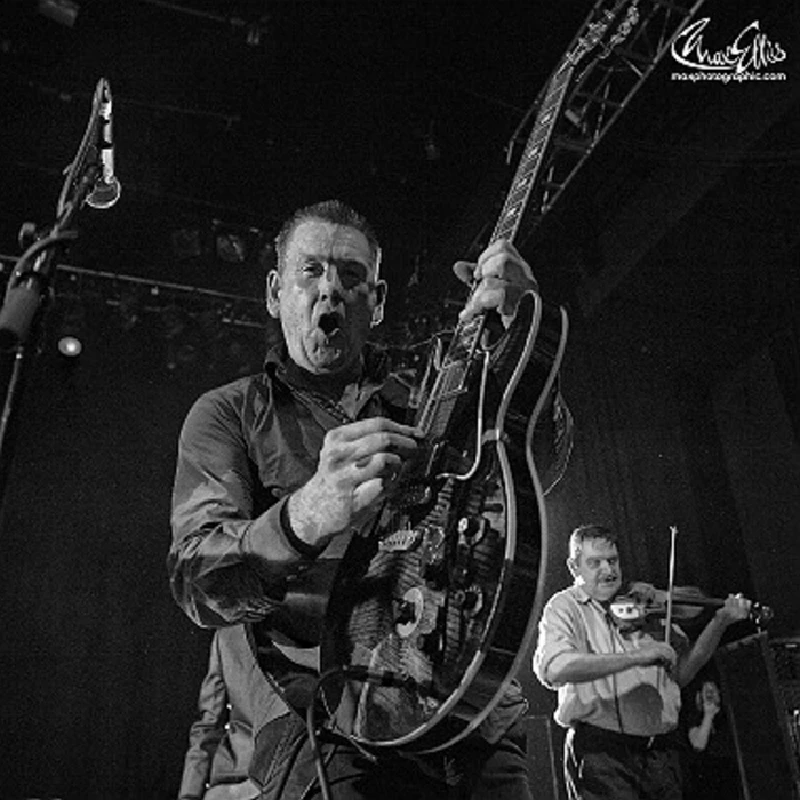
reviews |
|
Devil on the Wind (2009) |
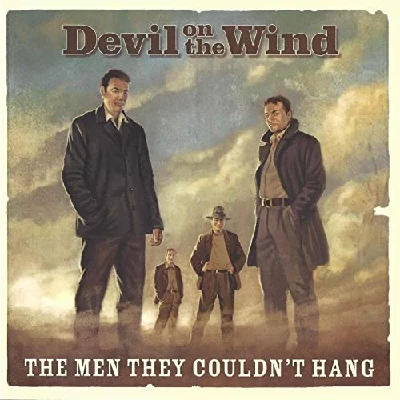
|
| Formulaic first album in six years from the increasingly Country and Western-influenced Men They Couldn't Hang, which, while starting promisingly, quickly slips into predictability |
most viewed articles
current edition
Carl Ewens - David Bowie 1964 to 1982 On Track: Every Album, Every SongArmory Show - Interview with Richard Jobson
Colin Blunstone - Thalia Hall, Chicago, 16/7/2025
Visor Fest - Valencia, Spain, 26/9/2025...27/9/2025
John McKay - Interview
Bathers - Photoscapes 1
Robert Forster - Interview
Billie Eilish - O2 Arena, London, 10/7/2025
Loft - Interview
Sir Tim Rice - Interview
previous editions
Heavenly - P.U.N.K. Girl EPManic Street Preachers - (Gig of a Lifetime) Millennium Stadium, Cardiff, December 1999
Beautiful South - Ten Songs That Made Me Love...
Oasis - Oasis, Earl's Court, London, 1995
Trudie Myerscough-Harris - Interview
Prolapse - Interview
Pixies - Ten Songs That Made Me Love...
Coldplay - Wembley Arena. London, 16/8/2022
Boomtown Rats - Ten Songs That Made Me Love....
Peter Perrett - In Dreams Begin Responsibilities Interview Part One
most viewed reviews
current edition
Amy Macdonald - Is This What You've Been Waiting For?Sick Man of Europe - The Sick Man of Europe
Lucy Spraggan - Other Sides of the Moon
Davey Woodward - Mumbo in the Jumbo
Phew, Erika Kobayashi,, Dieter Moebius - Radium Girls
Alice Cooper - The Revenge of Alice Cooper
Bush - I Beat Loneliness
Blueboy - 2
Suzanne Vega - Flying With Angels
Cynthia Erivo - I Forgive You
Pennyblackmusic Regular Contributors
Adrian Janes
Amanda J. Window
Andrew Twambley
Anthony Dhanendran
Benjamin Howarth
Cila Warncke
Daniel Cressey
Darren Aston
Dastardly
Dave Goodwin
Denzil Watson
Dominic B. Simpson
Eoghan Lyng
Fiona Hutchings
Harry Sherriff
Helen Tipping
Jamie Rowland
John Clarkson
Julie Cruickshank
Kimberly Bright
Lisa Torem
Maarten Schiethart